新概念第二册讲义Lesson
新概念英语第二册+Lesson+25+Do+the+English+speak+English+讲义

Lesson 25 Do the English speak English?Part 1: TextI arrived in London at last.The railway station was big, black and dark.I did not know the way to my hotel, so I asked a porter.I not only spoke English very carefully, but very clearly as well. The porter, however, could not understand me.I repeated my question several times and at last he understood. he answered me, but he spoke neither slowly nor clearly.'I am a foreigner,' I said. Then he spoke slowly, but I could not understand him.My teacher never spoke English like that!The porter and I looked at each other and smiled.Then he said something and I understood it.'You'll soon learn English!' he said.I wonder. In England, each person speaks a different language. The English understand each other, but I don't understand them! Do they speak English?Part 2: New words and expressions1 railway ['reilwei] n.铁路2 porter ['pɔ:tə] n.搬运工3 several ['sevərəl] 几个4 foreigner['fɔrinə] n.外国人5 wonder ['wʌndə] v.感到奇怪★ railway n. rail(铁路)+way(路,途径)rail 扶手,栏杆,围栏jump the rail 出轨stair rails 楼梯的扶手ride the rails 逃火车票railway/railroad station:火车站火车站很大,又黑又暗。
新概念英语第二册+Lesson+4+An+exciting+trip+讲义

新概念英语第二册Lesson 4 An exciting tripI have just received a letter from my brother, Tim. He is in Australia. He has been there for six months. Tim is an engineer. He is working for a big firm and he has already visited a great number of different places in Australia. He has just bought an Australian car and has gone to Alice Springs, a small town in the centre of Australia. He will soon visit Darwin From there, he will fly to Perth. My brother has never been abroad before, so he is finding2 this trip very exciting.参考译文我刚刚收到弟弟蒂姆的来信,他正在澳大利亚。
他在那儿已经住了6个月了。
蒂姆是个工程师,正在为一家大公司工作,并且已经去过澳大利亚的不少地方了。
他刚买了一辆澳大利亚小汽车,现在去了澳大利亚中部的小镇艾利斯斯普林斯。
他不久还将到达尔文去,从那里,他再飞往珀斯。
我弟弟以前从未出过国,因此,他觉得这次旅行非常激动人心。
单词1.exciting adj. 令人兴奋的excited adj. (感到)兴奋的excite v. 令……兴奋(人作主语)It must be an exciting trip. 那一定是一次令人兴奋的旅行。
类似的词:surprising 令人惊奇的surprised 感到惊奇的interesting 令人感兴趣的interested 感到感兴趣的shocking 令人震惊的shocked 感到震惊的statisfying 令人满意的statisfied 感到满意的disappointing 令人失望的disappointed 感到失望的moving 令人感动的moved 感到感动的touching 令人感动的touched 感到感动的embarrassing 令人尴尬的embarrassed 感到尴尬的2.receive vt.(1)接到,收到,得到:When did you receive that letter?你什么时候收到那封信的?Susan received a gift/card this morning.今天上午苏珊收到了一份礼物/一张卡。
新概念第二册Lesson 4 An exciting trip讲义
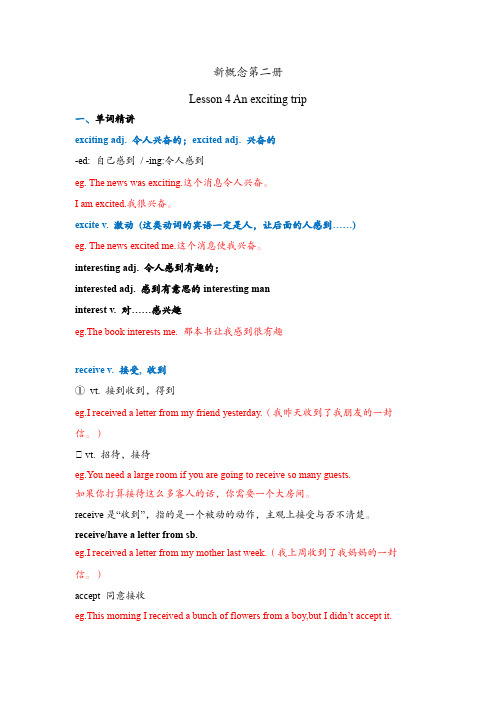
新概念第二册Lesson 4 An exciting trip一、单词精讲exciting adj. 令人兴奋的;excited adj. 兴奋的-ed: 自己感到/ -ing:令人感到eg. The news was exciting.这个消息令人兴奋。
I am excited.我很兴奋。
excite v. 激动(这类动词的宾语一定是人,让后面的人感到……)eg. The news excited me.这个消息使我兴奋。
interesting adj. 令人感到有趣的;interested adj. 感到有意思的interesting maninterest v. 对……感兴趣eg.The book interests me. 那本书让我感到很有趣receive v. 接受, 收到①vt. 接到收到,得到eg.I received a letter from my friend yesterday.(我昨天收到了我朋友的一封信。
)② vt. 招待,接待eg.You need a large room if you are going to receive so many guests.如果你打算接待这么多客人的话,你需要一个大房间。
receive是“收到”,指的是一个被动的动作,主观上接受与否不清楚。
receive/have a letter from sb.eg.I received a letter from my mother last week.(我上周收到了我妈妈的一封信。
)accept 同意接收eg.This morning I received a bunch of flowers from a boy,but I didn’t accept it.今天早上我收到了一个男孩送的一束花,但我没有接受。
take则是主动的“拿”、“取”eg.I received a beautiful pen from my uncle. My brother took it from me yesterday.我收到了叔叔送的一支漂亮的钢笔。
新概念第二册Lesson 95 A fantasy讲义
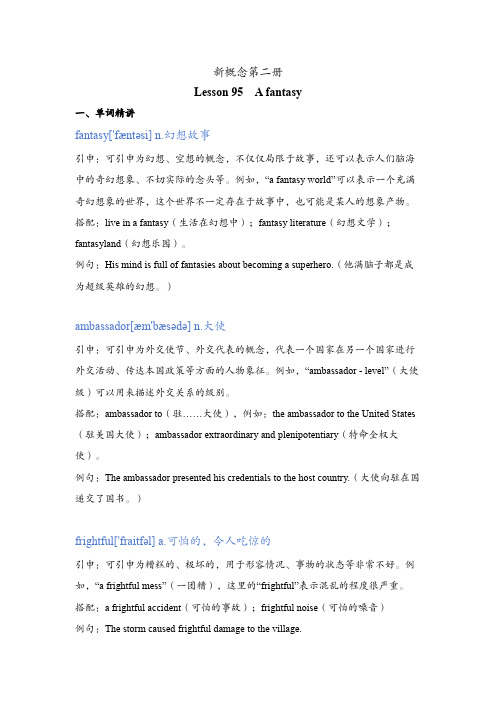
新概念第二册Lesson 95 A fantasy一、单词精讲fantasy['fæntəsi] n.幻想故事引申:可引申为幻想、空想的概念,不仅仅局限于故事,还可以表示人们脑海中的奇幻想象、不切实际的念头等。
例如,“a fantasy world”可以表示一个充满奇幻想象的世界,这个世界不一定存在于故事中,也可能是某人的想象产物。
搭配:live in a fantasy(生活在幻想中);fantasy literature(幻想文学);fantasyland(幻想乐园)。
例句:His mind is full of fantasies about becoming a superhero.(他满脑子都是成为超级英雄的幻想。
)ambassador[æm'bæsədə] n.大使引申:可引申为外交使节、外交代表的概念,代表一个国家在另一个国家进行外交活动、传达本国政策等方面的人物象征。
例如,“ambassador - level”(大使级)可以用来描述外交关系的级别。
搭配:ambassador to(驻……大使),例如:the ambassador to the United States (驻美国大使);ambassador extraordinary and plenipotentiary(特命全权大使)。
例句:The ambassador presented his credentials to the host country.(大使向驻在国递交了国书。
)frightful['fraitfəl] a.可怕的,令人吃惊的引申:可引申为糟糕的、极坏的,用于形容情况、事物的状态等非常不好。
例如,“a frightful mess”(一团糟),这里的“frightful”表示混乱的程度很严重。
搭配:a frightful accident(可怕的事故);frightful noise(可怕的噪音)例句:The storm caused frightful damage to the village.(暴风雨给村庄造成了可怕的破坏。
新概念第二册Lesson 31 Success story讲义
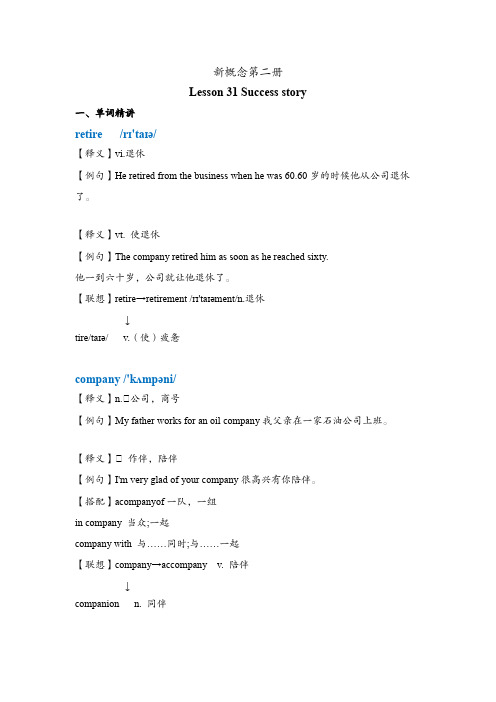
新概念第二册Lesson 31 Success story一、单词精讲retire /rɪ'taɪə/【释义】vi.退休【例句】He retired from the business when he was 60.60岁的时候他从公司退休了。
【释义】vt. 使退休【例句】The company retired him as soon as he reached sixty.他一到六十岁,公司就让他退休了。
【联想】retire→retirement /rɪ'taɪəment/n.退休↓tire/taɪə/ v.(使)疲惫company /'kʌmpəni/【释义】n.①公司,商号【例句】My father works for an oil company我父亲在一家石油公司上班。
【释义】① 作伴,陪伴【例句】I'm very glad of your company很高兴有你陪伴。
【搭配】acompanyof一队,一组in company 当众;一起company with 与……同时;与……一起【联想】company→accompany v. 陪伴↓companion n. 同伴bicycle /'baɪsɪkəl/【释义】n.自行车【例句】They usually go to school bybicycle.他们通常骑自行车上学。
【联想】bicycle→motorcycle n.摩托车↓recycle v.回收利用save /seɪv/【释义】vt.&vi.①积蓄,储蓄,攒钱【例句】I saved part ofmy salary each month.我每月把工资存起来一部分。
【释义】① 救,挽救【例句】He saved the boy from the fire.他从火中救出了那个男孩。
【释义】① 节省,节约【例句】We’ll take a taxi to save time.我们坐出租车,好节省时间。
新概念英语第二册+Lesson+34+课件

• I called _o_n__ you five times yesterday. Were you out? • It’s too late go to dinner. Why don’t we call the whole thing _o_ff_? • We called _o_u_t_ to him but he could not hear us. • I called __at__ the post office on my way to work. • “Help!” the injured called _o_u_t_to the rescue team.
03
Grammar
call… (1)call at表示"对(某个人家或地方)进行短暂访问": He calls at every house in the street once a month. 他每月对这条街上的每户人家光顾一次。 He was asked to call at the police station. 他被告知去警察局一趟。 (2)call on 表示"拜访"、"探望": Have you called on George recently? 你最近去看过乔治吗?
4. He was amused too, because he never expected the bicycle to be found. amused:感到好笑的 amusing:令人发笑的 amuse V. 使发笑 expect sb to do sth. 期待某人做某事 expect sth to be done 期待某物被做 expect+that 从句 预料、预计... eg:他期望Linda 同他一起去。
新概念英语第二册+Lesson+41+Do+you+call+that+a+hat+讲义
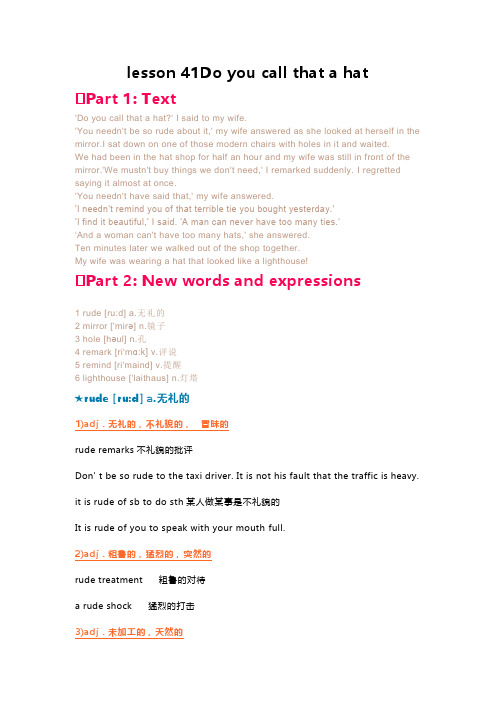
lesson 41Do you call that a hatPart 1: Text'Do you call that a hat?' I said to my wife.'You needn't be so rude about it,' my wife answered as she looked at herself in the mirror.I sat down on one of those modern chairs with holes in it and waited.We had been in the hat shop for half an hour and my wife was still in front of the mirror.'We mustn't buy things we don't need,' I remarked suddenly. I regretted saying it almost at once.'You needn't have said that,' my wife answered.'I needn't remind you of that terrible tie you bought yesterday.‘'I find it beautiful,' I said. 'A man can never have too many ties.‘'And a woman can't have too many hats,' she answered.Ten minutes later we walked out of the shop together.My wife was wearing a hat that looked like a lighthouse!Part 2: New words and expressions1 rude [ru:d] a.无礼的2 mirror ['mirə] n.镜子3 hole [həul] n.孔4 remark [ri'mɑ:k] v.评说5 remind [ri'maind] v.提醒6 lighthouse ['laithaus] n.灯塔★rude [ru:d] a.无礼的1)adj.无礼的,不礼貌的,冒昧的rude remarks不礼貌的批评Don' t be so rude to the taxi driver. It is not his fault that the traffic is heavy. it is rude of sb to do sth某人做某事是不礼貌的It is rude of you to speak with your mouth full.2)adj.粗鲁的,猛烈的,突然的rude treatment 粗鲁的对待a rude shock 猛烈的打击3)adj.未加工的,天然的rude cotton原棉rudeness n.无礼rudely adv.粗鲁地,无礼地★mirror ['mirə] n.镜子1)n.镜子,反射镜look at oneself in the mirror照镜子She looked in the mirror.她照镜子。
新概念英语第二册+Lesson+53+Hot+snake+详解讲义

新概念2 第53课…a fireman accidentally discovered the cause.……一个消防队员偶然发现了起火的原因。
discover本身含有偶然发现(某个已经存在的东西)的含义:I don't know who discovered America. 我不知道谁发现美洲的。
在discover前面加上accidentally更加强了“偶然”、“意外”的含义。
He noticed the remains of a snake which was wound round the electric wires of a 16,000-volt power line.他发现了缠绕在16,000伏高压线上的一条死蛇。
(1)the remains表示“尸体”、“残骸”,必须用复数形式:wound /wuːnd/为wind的过去分词。
wind在这里不表示“蜿蜒”,而表示“卷在……上”、“缠绕”,常与around/round连用:wind sth around sth 把…缠绕在…上Did you wind this piece of wire round the tree? 是你把这根铁丝缠在树上的吗?wound, n,(刀、枪或其他武器所致的)创伤,伤口;(感情或名誉的)损害,痛苦v. (武器或其他利器)伤害,使受伤;(在感情上)使受创伤.(3)wire指具体的电线、铁丝等,line在这里指“线路”,含义比wire广。
When it did so…当它这样做时……so常用于一些动词之后,代指前面提过的某个动作/某件事,以免重复. I think so.snatch , v.抢,夺,掠取. snatch up 抓起来The thief snatched her bag and ran away. 贼把她的包抓起来逃跑了。
He snatched the paper as his mother was about to see it. 在他妈妈刚要看那张纸的时候,他把它夺走了。
新概念英语第二册+Lesson+19+Sold+out!+讲义

Lesson 19 Sold out!Part 1: Text'The play may begin at any moment,' I said.'It may have begun already,' Susan answered.'I hurried to the ticket-office. 'May I have two tickets please ?' I asked. 'I'm sorry, we've sold out,' the girl said.'What a pity!' Susan exclaimed.Just then, a man hurried to the ticket-office.'Can I return these two tickets?' he asked.'Certainly,' the girl said.'Could I have those two tickets please ?' I asked.'Certainly, 'the girl said, 'but they are for next Wednesday's performance. 'I might as well have them,' I said sadly.Part 2: New words and expressions1. hurry ['hʌri] v.匆忙2. ticket office 售票处3. pity['piti] n.令人遗憾的事4. exclaim [ik'skleim] v.大声说5. return [ri'tə:n] v.退回6. sadly ['sædli] ad.悲哀地,丧气地Part 3: Notes on the text1、'The play may begin at anymoment,' I said.may 可能,表示推测at any moment 在任何时候, 随时policeman may arrive at any moment.天随时可能下雨.It may/might rain at any moment.at the moment =nowat that moment =just then (一般过去时)就在那时2.It may have begun already…...may+动词原形, 表示对现在、未来的推测She may be a model.may+ have done,表示对过去的推测She may have been a model.I may have watched TV last night.3、I hurried to the ticket office. 'May I have two tickets please?' I asked.★ hurried to+sp 匆匆忙忙地去某地★May 表示-请求,询问,说明一件事May I have your name? (比“What’s your name?”更有礼貌些)Can I have your name?Can和may表示-请求,询问的区别:Can 可以用在第一,二人称.may 只能用第一人称.4、'I'm sorry, we've sold out,' the girl said.sell out (店主)售完(某种货物),(货)被售完They have sold out of eggs.Tickets for tonight’s performance are sold out5.'What a pity!’ Susan exclaimed.感叹句 What a pity (it is)!exclaim 大声说,比shout正式。
新概念英语第二册Lesson+79+By+air乘飞机+讲义
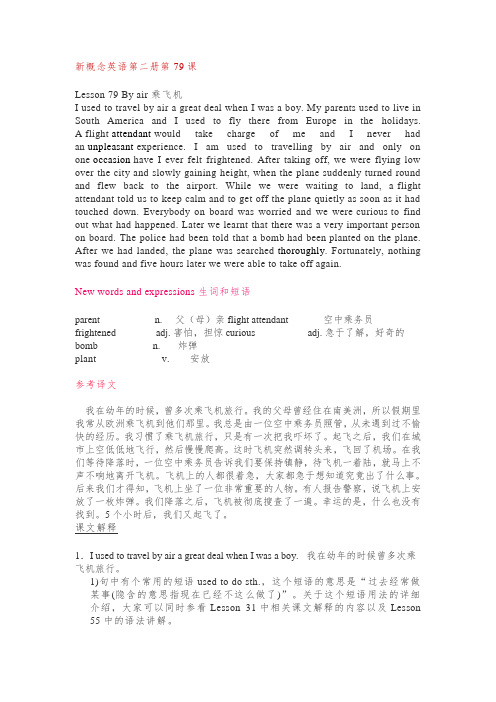
新概念英语第二册第79课Lesson 79 By air 乘飞机I used to travel by air a great deal when I was a boy. My parents used to live in South America and I used to fly there from Europe in the holidays.A flight attendant would take charge of me and I never had an unpleasant experience. I am used to travelling by air and only on one occasion have I ever felt frightened. After taking off, we were flying low over the city and slowly gaining height, when the plane suddenly turned round and flew back to the airport. While we were waiting to land, a flight attendant told us to keep calm and to get off the plane quietly as soon as it had touched down. Everybody on board was worried and we were curious to find out what had happened. Later we learnt that there was a very important person on board. The police had been told that a bomb had been planted on the plane. After we had landed, the plane was searched thoroughly. Fortunately, nothing was found and five hours later we were able to take off again.New words and expressions 生词和短语parent n. 父(母)亲flight attendant 空中乘务员frightened adj. 害怕,担惊curious adj. 急于了解,好奇的bomb n. 炸弹plant v. 安放参考译文我在幼年的时候,曾多次乘飞机旅行。
新概念英语第二册 Lesson 42 Not very musical 讲义
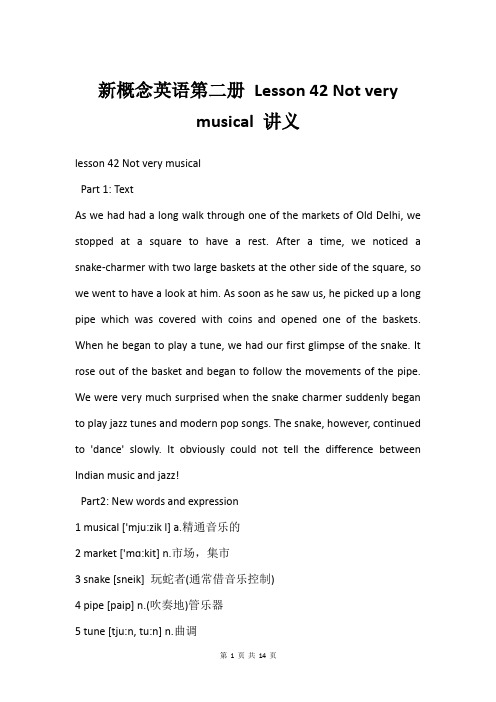
新概念英语第二册Lesson 42 Not verymusical 讲义lesson 42 Not very musicalPart 1: TextAs we had had a long walk through one of the markets of Old Delhi, we stopped at a square to have a rest. After a time, we noticed a snake-charmer with two large baskets at the other side of the square, so we went to have a look at him. As soon as he saw us, he picked up a long pipe which was covered with coins and opened one of the baskets. When he began to play a tune, we had our first glimpse of the snake. It rose out of the basket and began to follow the movements of the pipe. We were very much surprised when the snake charmer suddenly began to play jazz tunes and modern pop songs. The snake, however, continued to 'dance' slowly. It obviously could not tell the difference between Indian music and jazz!Part2: New words and expression1 musical ['mju:zik l] a.精通音乐的2 market ['mɑ:kit] n.市场,集市3 snake [sneik] 玩蛇者(通常借音乐控制)4 pipe [paip] n.(吹奏地)管乐器5 tune [tju:n, tu:n] n.曲调6 glimpse [glimps] n.一瞥7 snake [sneik] n.蛇8 movement['mu:vm nt] n.动作9 continue[k n'tinju:] v.继续10 dance [dɑ:ns] v.跳舞11 obviously [' bvi sli] ad.显然12 difference ['difr ns] n.差别13 Indian ['indi n] a.印度的★musical adj.1)adj. 音乐的a musical instrument 乐器a musical performance 音乐演奏a musical film 音乐片2)adj.(声音等)富有音乐性的,美妙的a musical voice美妙的嗓音★ market n.(商品的)市场,销路,需求(可数名词)market for… ……市场The foreign markets for apple this year are not as good as last year. Can you find a market for these shoes你能给这些鞋找到销路吗?market price 市场价格fair1)集市(尤指买卖牲口,农产品的地方,在固定的地点定期举行,常伴有娱乐表演)2)展览会a world fair 博览会,展览会shop 商店,店铺department store★snake charmer玩蛇者(借音乐控制)charmer n.有吸引力的人charm v.取悦,迷住,吸引He charms everyone he meets.他使他遇见的每一个人都很愉快。
新概念第二册Lesson 12 Goodbye and good luck讲义
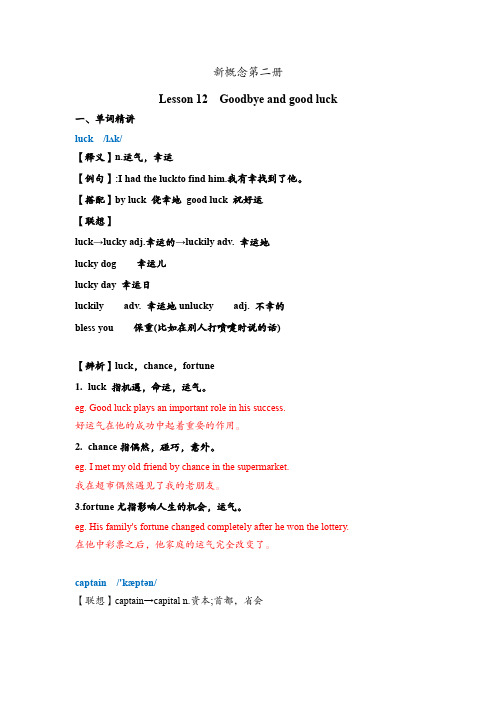
新概念第二册Lesson 12 Goodbye and good luck 一、单词精讲luck /lʌk/【释义】n.运气,幸运【例句】:I had the luckto find him.我有幸找到了他。
【搭配】by luck 侥幸地good luck 祝好运【联想】luck→lucky adj.幸运的→luckily adv. 幸运地lucky dog 幸运儿lucky day 幸运日luckily adv. 幸运地unlucky adj. 不幸的bless you 保重(比如在别人打喷嚏时说的话)【辨析】luck,chance,fortune1.luck 指机遇,命运,运气。
eg. Good luck plays an important role in his success.好运气在他的成功中起着重要的作用。
2.chance指偶然,碰巧,意外。
eg. I met my old friend by chance in the supermarket.我在超市偶然遇见了我的老朋友。
3.fortune尤指影响人生的机会,运气。
eg. His family's fortune changed completely after he won the lottery.在他中彩票之后,他家庭的运气完全改变了。
captain /'kæptən/【联想】captain→capital n.资本;首都,省会【例句】The man in charge ofa ship is called a captain.负责船上事务的人被称为船长。
【释义】①陆军上尉,海军上校【例句】The captain led his soldiers bravely in the battle.这位陆军上尉在战斗中勇敢地率领他的士兵。
【释义】①(足球队等)队长【例句】The captain of the football team encouraged his teammates before the game.足球队队长在比赛前鼓励他的队友。
新概念英语第二册课课件 Lesson

•A public house which was recently bought by Mr. Ian Thompson is up for sale.
•a public house 酒吧、酒店,口语缩略为pub •up for sale 有待出售,供出售 •be up for 有待于…,为了某一目的 •This problem is up for discussion. •这个问题有待于讨论。 •on sale 打折卖 for sale 待售;出售
• ★shake(shook,shaken) v. 摇动 • vt.&vi. 摇,摇动,抖动 • Mr. Thompson shook his head. • His hands appear to be shaking. • 他的手看上去在发抖。 • ② vt. 同…握手 • Dan shook hands with him.
A public house which was recently bought by Mr. Ian Thompson is up for sale. Mr.Thompson is going to sell coming from the bar. The next morning, he found that the doors had been blocked by chairs and the furniture had been moved. Though Mr.Thompson had turned the lights off before he went to bed, they were on in the morning.He also said that he had found five empty whisky bottles which the ghost must have drunk the night before. When I suggested that some villagers must have come in for a free drink, Mr.Thompson shook his head. The villagers have told him that they will not accept the pub even if he gives it away.
新概念英语第二册Lesson01Aprivateconversation私人谈话讲义

新概念英语第二册Lesson 01A private conversation私人谈话A private conversationLast week I went to the theatre. I had a very good seat. The play was very interesting.I did not enjoy it. A young man and a young woman were sitting behind me. They were talking loudly. I got very angry. I could not hear the actors. I turned round. I looked at the man and the woman angrily. They did not pay any attention. In the end, I could not bear it.I turned round again. I cant hear a word! I said angrily.Its none of your business, the young man said rudely. This is a private conversation!【课文翻译】私人谈话Last week I went to the theatre.上星期我去看戏。
I had a very good seat. The play was very interesting. I did not enjoy it.我的座位很好,戏很有意思,但我却无法欣赏。
A young man and a young woman were sitting behind me. They were talking loudly.一青年男子与一青年女子坐在我的身后,大声地说着话。
新概念第二册Lesson 76 April Fools’ Day讲义
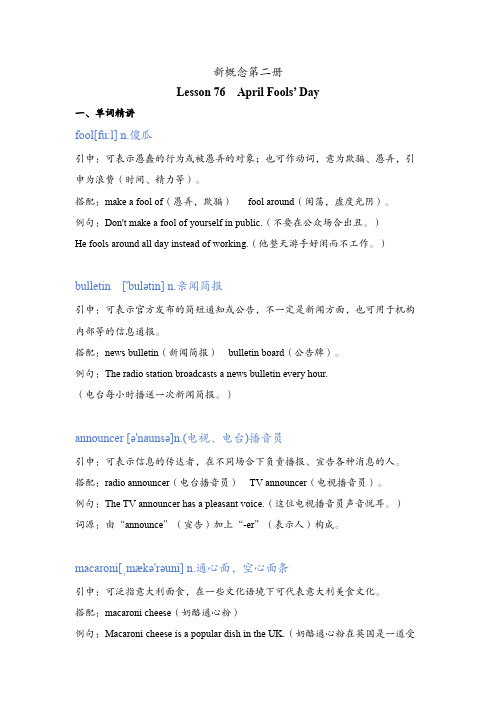
新概念第二册Lesson 76 April Fools’ Day一、单词精讲fool[fu:l] n.傻瓜引申:可表示愚蠢的行为或被愚弄的对象;也可作动词,意为欺骗、愚弄,引申为浪费(时间、精力等)。
搭配:make a fool of(愚弄,欺骗)fool around(闲荡,虚度光阴)。
例句:Don't make a fool of yourself in public.(不要在公众场合出丑。
)He fools around all day instead of working.(他整天游手好闲而不工作。
)bulletin ['bulətin] n.亲闻简报引申:可表示官方发布的简短通知或公告,不一定是新闻方面,也可用于机构内部等的信息通报。
搭配:news bulletin(新闻简报)bulletin board(公告牌)。
例句:The radio station broadcasts a news bulletin every hour.(电台每小时播送一次新闻简报。
)announcer [ə'naunsə]n.(电视、电台)播音员引申:可表示信息的传达者,在不同场合下负责播报、宣告各种消息的人。
搭配:radio announcer(电台播音员)TV announcer(电视播音员)。
例句:The TV announcer has a pleasant voice.(这位电视播音员声音悦耳。
)词源:由“announce”(宣告)加上“-er”(表示人)构成。
macaroni[ˌmækə'rəuni] n.通心面,空心面条引申:可泛指意大利面食,在一些文化语境下可代表意大利美食文化。
搭配:macaroni cheese(奶酪通心粉)例句:Macaroni cheese is a popular dish in the UK.(奶酪通心粉在英国是一道受欢迎的菜肴。
新概念英语第二册+Lesson3+Please+send+me+a+card+讲义
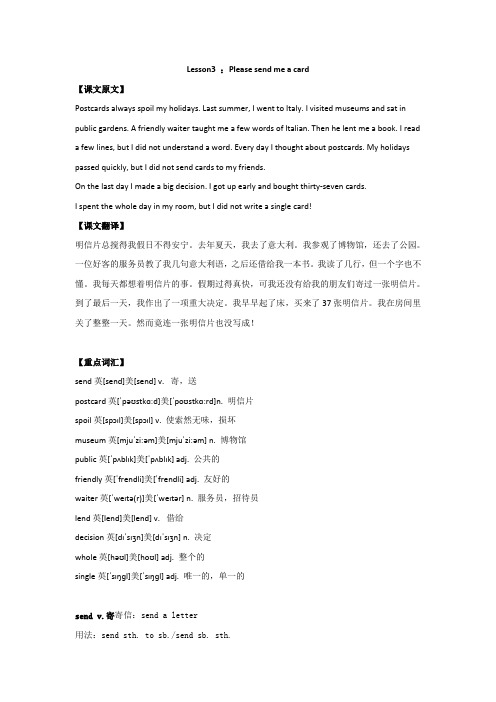
Lesson3 :Please send me a card【课文原文】Postcards always spoil my holidays. Last summer, I went to Italy. I visited museums and sat in public gardens. A friendly waiter taught me a few words of Italian. Then he lent me a book. I read a few lines, but I did not understand a word. Every day I thought about postcards. My holidays passed quickly, but I did not send cards to my friends.On the last day I made a big decision. I got up early and bought thirty-seven cards.I spent the whole day in my room, but I did not write a single card!【课文翻译】明信片总搅得我假日不得安宁。
去年夏天,我去了意大利。
我参观了博物馆,还去了公园。
一位好客的服务员教了我几句意大利语,之后还借给我一本书。
我读了几行,但一个字也不懂。
我每天都想着明信片的事。
假期过得真快,可我还没有给我的朋友们寄过一张明信片。
到了最后一天,我作出了一项重大决定。
我早早起了床,买来了37张明信片。
我在房间里关了整整一天。
然而竟连一张明信片也没写成!【重点词汇】send 英[send]美[send] v. 寄,送postcard 英[ˈpəʊstkɑːd]美[ˈpoʊstkɑːrd]n. 明信片spoil 英[spɔɪl]美[spɔɪl] v. 使索然无味,损坏museum 英[mjuˈziːəm]美[mjuˈziːəm] n. 博物馆public 英[ˈpʌblɪk]美[ˈpʌblɪk] adj. 公共的friendly 英[ˈfrendli]美[ˈfrendli] adj. 友好的waiter 英[ˈweɪtə(r)]美[ˈweɪtər] n. 服务员,招待员lend 英[lend]美[lend] v. 借给decision 英[dɪˈsɪʒn]美[dɪˈsɪʒn] n. 决定whole 英[həʊl]美[hoʊl] adj. 整个的single 英[ˈsɪŋɡl]美[ˈsɪŋɡl] adj. 唯一的,单一的send v.寄寄信:send a letter用法:send sth. to sb./send sb. sth.类似的用法还有 give,take,pass,read,sell...send/take children to school区别:take:强调某人亲自送;send则是通过第三人去送,如美国的校车postcard n.明信片简写为card,由此引申出:namecard/visiting card:名片ID card:身份证credit card:信用卡spoil(spoiled or spoilt) v.使索然无味,损坏(重点词)几种破坏:打破玻璃用break;damage:破坏,但是程度不一定很重;destroy:破坏,彻底摧毁;以上三个是指物理上的破坏,而spoil主要指精神上:spoil:把东西的质量变得不好了;生活中不顺心的事。
- 1、下载文档前请自行甄别文档内容的完整性,平台不提供额外的编辑、内容补充、找答案等附加服务。
- 2、"仅部分预览"的文档,不可在线预览部分如存在完整性等问题,可反馈申请退款(可完整预览的文档不适用该条件!)。
- 3、如文档侵犯您的权益,请联系客服反馈,我们会尽快为您处理(人工客服工作时间:9:00-18:30)。
Lesson 6【NEW WORDS AND EXPRESSIONS】★beggar n. 乞丐 beg v.乞求 I beg your pardon?ask for :请求得到 beg for :乞求得到★food n. 食物不可数: a lot of food★pocket n. 衣服口袋inner pocket:内口袋/ jacket pocket/coat pocketpocket book:袖珍书 pocket dictionary:袖珍词典pocket money:(小孩)零花钱 beer money:(男孩)零花钱 change:零钱get exact change:准备好正确的零花钱pocket pick:车上的小偷★call v. 拜访,光顾call sb:给某人打电话 call up sb:给某人打电话 call back:回某人电话call on sb拜访某人 call at,at一般和地点相连call at+地点=visit someplace拜访某地I will call on you. I will call at your Home.call out =shout,大声喊call in sb:招集和邀请某人: For the project, the government called in a lot of experts. 【课文讲解】ask sb for sth:问某人要什么东西;request forfor;为了这个目的去请求某人,sb更多的时候不出现,ask for sthThe boy asked for money again/once more.in return for this:作为对什么的回报 in return:作为回报He doesn't want anything in return.hospitality:热情 I'll buy a present for him in return for hospitality.stand on one's hands:用手着地跪着,膝盖:knees, stand on one's knees躺着,躺:lie,lie in bed, lie on one's back:仰面躺着lie on one's side:侧躺趴着:lie on one's stomachtell sb about sth,about:关于,通过其他事自己得出结论,tell you about himtell sb sth:告诉某人某件事(把事情直接告诉),tell you the news/tell you the word tell you about the wordeverybody作为主语一定作单数看待,属于不定代词, 所有的不定代词作为主语一律为单数看待in the street英国写/on the street美国写[Key structures】关键句型a,the和somea:单数,可数名词the:可加单数/复数,还可加不可数名词,加在什么名词前面都对some:只能加在不可数名词的前面或可数名词复数的前面a和the的区别 a是泛指,a man;特指,the man在文章当中第一次出现名词的时候往往用a和an修饰,第二次出现的时候用theA man is walking towards me.The man is carrying a parcel.The parcelis full of meat.笼统感念:某某一类/一种东西I have just drunk a glass of milk. Milk is very refreshing.I ate an apple. /Apples are delicious.I like oranges. Would you like some oranges?Mrs.Jones bought a bag of flour,a bag of sugar,and some tea.She always buys flour,sugar and tea at the grocer's.NamesWe cannot put a or the in front of names表示某某一类人当中,具有这种特征当中的一个,a Mr.zhangknock off:下班,He knocked off earlier.knock sth off+地点,knock the vase off the tableknock off:打折,knock 10% off the price.knock over,A car knocked the boy over.如果有地点,off; 无地点,over,I knocked the boy off the bicycle.Exercises1...out... knock out :打陨,boxer:拳击手在拳击场合中,把人打倒在地叫knock out2...over...无地点3...off...4...at...5...D...say说/tell告诉He says + 句子;He says+that+句子;say to sb.tell sb.+句子:tell sb.+that+句子He said to me/he told me6..they all/all they, all of us/all of them我们所有人all of us, we alleach/every 每一个each:强调个体;every 强调整体every adj.+n. 每一个(书,本,人等)each adj.&pron.:each adj.+n; each pron.直接作主语或者宾语every person likes...each person likes.../each likes...every 不能做主语;each 强调个体,使用第三人称单数7...once a month:每月一次,属于频率对频率提问:how often 提问多久:how long 提问次数:how many timesHow many times do you visit your mother each month?How long do you visit your mother?对时间提问How often do you visit your mother?对时间和次数提问How soon 多久以后 How soon will you finish your Homework?8...out of work 失业 I am out of work,/I lose my job.10...A... piece of:a piece of cheese 一块奶酪bar:a bar of chocolate---一块巧克力bar 门闩:长条状:a bar of chocolate; a bar of soapblock 块,一大块: block v.堵塞;block n.房子12...A...same age and size 同年代同样式street 两边有房子的街道 way, on the way, in the way 挡住某人的路(强调方向)road 路的通称:road Home 通往家的路 route 路线1.How can you___b____if you are not ____?A.listening/hearingB.hear/listeningC.be listening/hearD.be hearing/listening tolisten听/hear听见如果你不听,怎么可能听见呢?be不能加动词原形;be+ -ed/-ing can+动词原形2.The girl even won't have her lunch before she____her Homework.A.will finishB.is finishingC.had finishedD.finisheswon't=will not 状语从句中,用一般现在时取代将来时.3.Those who have applied for the post__A__in the office.(此题超前)A.are being interviewedB.are interviewingC.interviewingD.to be interviewing who 在名词后面,引导定语从句4.The old scientist _____to do more for the country.A.is wishingB.has been wishing.C.wishesD.has been wished合理不合情scientist 科学家;wish 希望表示状态、感觉、情绪、精神活动的动词不可用于进行时态. wish sb.to do5.If he______,don't wake him up.A.still sleepsB.is still sleepingC.still had been sleepingD.will be sleeping still if——一般用一般现在式如果他在睡觉的话,不要吵醒他now现在进行时 often,always一般进行时 just,already 现在完成时last week,last summer...一般过去时结账退房 Check OutW: Good morning, sir. What can I do for you?M: I am leaving at 10:00, so I'd like to settle my account now.W: Yes, sir. May I have your room number?M: My room number is 1010 and the name is Ted Black.W: Right, just wait a minute. I will get your bill ready for you right away.M: Thanks.W: Have you used your mini-bar since breakfast?M: No, I haven't.W: Very good sir. Here is your bill. Please check and sign it.M: Ok. Excuse me, what's this charge for?W: That's for the breakfast you ordered from the service.M: Oh, yes. It's on Wednesday morning. Sorry about that.W: That's all right. Well, it's all together $260.M: Here you are.W: Thank you. Have a nice trip.W: Can I help you, sir?M: Yes, I am checking out.W: Can I have your key and room number, pls?M: Room 1419. Here is my key.W: Here is your bill, sir. Could you pls check it?M: It's all right. Pls charge it to my credit card.W: Here you are, sir. You are all set. I hope you enjoyed your stay and that next time you are in town, you will stay with us again.M: I will. Where can I leave my luggage? I really want to leave after lunch.W: The bell captain will put it in storage room. When you are ready to leave, you can claim your luggage from him.M: Thanks very much and goodbye!Always Thirsty 总感到口渴"I had an operation," said a man to his friend, "and the doctor left a sponge in me."一个男人对他的朋友说:“我动了一次手术,手术后医生把一块海绵忘在我的身体里了。
